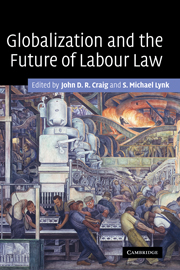Book contents
- Frontmatter
- Contents
- Notes on contributors
- Acknowledgements
- Table of cases
- List of abbreviations
- Introduction
- PART I Perspectives on globalization
- PART II International labour standards
- PART III The European Union
- PART IV The Americas
- 9 Labour rights in the FTAA
- 10 Globalization and the just society – core labour rights, the FTAA, and development
- 11 The future of labour integration: the South American perspective
- PART V The ILO
- PART VI Labour rights
- Bibliography
- Index
10 - Globalization and the just society – core labour rights, the FTAA, and development
Published online by Cambridge University Press: 23 July 2009
- Frontmatter
- Contents
- Notes on contributors
- Acknowledgements
- Table of cases
- List of abbreviations
- Introduction
- PART I Perspectives on globalization
- PART II International labour standards
- PART III The European Union
- PART IV The Americas
- 9 Labour rights in the FTAA
- 10 Globalization and the just society – core labour rights, the FTAA, and development
- 11 The future of labour integration: the South American perspective
- PART V The ILO
- PART VI Labour rights
- Bibliography
- Index
Summary
Introduction – a familiar response to a possible FTAA labour rights agenda
The philosopher Nietzsche observed that “the most common form of stupidity is to forget what it is you are trying to do”. There is a lot of truth in that remark. We often confuse our real objectives with mere epiphenomena – most typically we confuse our true goals with our means for achieving them. So, in an effort to take Nietzsche's observation seriously, we should start with some basic questions about our purposes. Why are we here? Why do nation states enter into international treaties regarding trade and other aspects of economic integration? What do labour ministries, labour law, and labour market policy have to do with these agreements? In particular, what should be the attitude of governments in the Americas regarding the “trade and core labour standards” debate?
There is a traditional, or at least familiar, reply to this last question. It goes like this.
Central and South American countries might be deeply distrustful of a labour rights agenda in a possible FTAA for the following reasons. First, and fundamentally, the “trade and labour issue” is a side show made necessary by domestic and political demands within the United States, and by the resulting conditionality of the Trade Promotion Authority granted by the US Congress. Second, these politics are essentially the by-product of several domestic political forces – protectionist interests, on the one hand, and misguided anti-globalization forces on the other.
- Type
- Chapter
- Information
- Globalization and the Future of Labour Law , pp. 274 - 303Publisher: Cambridge University PressPrint publication year: 2006
- 1
- Cited by



